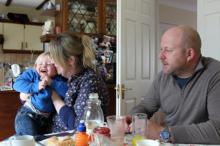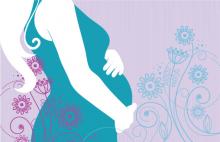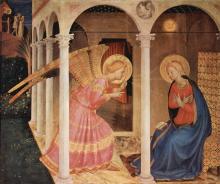pregnancy

DUBLIN, Ireland — Ruth Bowie was in the throes of grief when she found out she would never know her unborn child. At the 12-week mark, a pregnancy scan showed the baby had anencephaly, a fatal condition in which a portion of the brain and skull never form.
Bowie, 34, a pediatric nurse, knew the implications of the birth defect even before the doctor explained. But the life-changing news didn’t stop there.
“The doctors said we will continue to look after you, or else you can choose to travel,” she recalled.
Put another way, if she and her husband wanted to seek an abortion, they would have to travel to England to end the pregnancy.

Advent suggests so many mysteries of God's patience. One rarely commented case is God as Father and embryo. It is extra Biblical so imagination can only begin to tell the bizarre tale. Gabriel's annunciation and appearance to Joseph begins the period of waiting and soul searching, but a remarkable gap exists in the Advent story. Luke 1:56 makes this cursory remark as though it would suffice:
Mary stayed with Elizabeth for about three months and then returned home.
Presumably the second trimester of Mary's pregnancy is treated with a passing reference. If we simply take the divine conception of Jesus at face value, there was a moment in human history where God existed as Father in the heavens and embryo in Mary's uterus. Paradox of paradoxes. The Creator in utero.

THE TASTE OF the election still may be in our mouths—but Advent is breaking in.
Advent is a four-week stomp to Christmas. It is the time when God starts to show. God is pregnant during Advent: pregnant with possibilities that somehow, some way, someday, things will be different. They will taste better. We will know their taste better. We will be able to be engaged in our lives and our commitments and also be at peace. We will be the ones at the birthside, marveling about how God could dare come as a child or send heaven to earth, spirit to flesh, drenching humanity with divinity. The big words for this showing will be “Son of God” and “joy to the world.” The angels will sing, the night will go silent, the people will hark.
This Christmas would be a great time to notice what we have already seen: that when leaders and things get too large, when we put too much trust or hope in them, they revert to a brutal and brutalizing smallness. When we put trust in what we can notice, what we can do and who we can be, we are rarely disappointed. We expect, expectantly, as though we too were pregnant, day by day, with the possible.
For now, there is the waiting, the preparing for an Advent practice that will smell and taste good, that will open doors on more than a calendar.
I am an avid reader of women’s magazines, especially those that have a centerfold of the perfect Christmas dinner. I praise that dinner, hope for it, plan for it, and then eat with vigor what really comes out. A friend has a sign on her refrigerator about the difference between what we usually have and what the magazine announced: “It’s not going to happen that way.” By that sign, she is preparing herself for a day and a life of surprises. She is grooming her “to don’t” list.

#5. Delivery complications: Amy was a real trooper when Mattias was born, but nothing about it was easy. Actually he and I had eerily similar experiences making our way into the world. We both were exactly the same length and weight, we both were faced the wrong way, and both of us were finally delivered by caesarian section, after putting our moms through hours of hardcore labor.
The story I’ve heard is that my delivery was a big part of why my folks decided not to have any more children. Before that, they planned on having more but it was too much to deal with. And let me tell you that I can sympathize. I was in the room both when Amy tried to deliver naturally, and when they cut her wide open and yanked the little peanut out. His face was blue from a lack of oxygen, and his umbilical cord wrapped twice around his neck. Though I’ve never experienced such awe and joy in my life, I also have no desire to relive that sort of terrifying vulnerability.
#4. Postpartum: We didn’t recognize it as such for almost a year, but Amy suffered from pretty severe postpartum depression after Mattias was born. In a phrase, it sucked. I also happened to be running for local political office at the time, which added stress to the situation, but I didn’t know what the hell was going on. It was our first time, after all, and no one really warned us about what to do if your wife has quasi-psychotic images of herself pushing your baby down the stairs. She was so worried she was going crazy that she didn’t tell anyone for fear that they might take Mattias away from her. So instead, she tried to manage it, quite unsuccessfully, on her own for nearly 12 months.
The breaking point finally came one night when we were lying in bed and I laid it all out. I knew something was really wrong, but I had no idea what it was. I could feel her withdrawing farther away from me every day, and I felt like I couldn’t do anything about it.

I find myself thinking a lot about maternal mortality (and the issues that surround it, like access to contraception) lately, partly because I’ll soon be moving to a country with one of the world’s most dismal maternal mortality rates, and partly because my husband and I aren’t planning to have more biological children, which means that we’re contracepting for the duration.
Also, Nicholas Kristof and Sheryl WuDunn’s Half the Sky movement is gaining even more visibility — PBS’s Independent Lens is creating a series of short films and some longer features on issues raised in their bestselling, well-worth-reading book even as birth control reemerges again and again as a point of contention between Catholic bishops and nuns, between government policy and religious conviction, and even, as Amy Frykholm as suggested, among evangelicals.
Recently I’ve become aware that unwanted pregnancies are nothing new — certainly not the product of a culture that’s “anti-life” or anti-children, as the new-ish evangelical suspicion of birth control has it. In the 1850s, Mathilde Shillock, a German immigrant settled on the Minnesota frontier wrote,
“God has entrusted us with a son...it seems that his father is happy over it, I myself do not wish for any more children, as I look upon life as a heavy burden. [...] pity is all I can offer [this child]. Pity and a feeling of duty towards him to lighten his blameless fate.”

This is my first Mother’s Day as a mom, and you know what the best part is? I get to celebrate and sleep through the night.
I’m currently 25 weeks pregnant with the first child for my husband and me. I am enjoying the beautiful rite of passage many women are fortunate enough to experience. Even though every time I experience a belly twitch, leg cramp, or pain in my back I acknowledge that I already am a mother, celebrating without a baby in my arms still seems a bit hasty.
Initially, I told my husband that the only Mother’s Day celebration I wanted was to have my dessert of choice on Sunday (I angle for this on most days, though, so it isn’t too unique). But the more I thought about it, I decided we could do something better.

Soon it will be Mother’s Day in the United States. For most women in developed nations, motherhood comes after months of joyful preparation to make sure the birth goes as smoothly as possible. But in places far away from the world of prenatal vitamins and baby showers, women routinely deliver their children at home, hundreds of miles away from the nearest doctor or midwife. This is the story of a health worker in South Sudan who is fighting for change and finding strength in his faith.


To be a people marked by the faith of Mary is to be a people, who say, "Ok, I don’t understand what’s going on and I know that my life isn’t going to end up looking like one I would choose out of a catalogue but I trust that God is at work in all of it."
Blessedness is being used for God’s purpose more than it’s getting what I want or things being easy.
Christmas itself isn’t about getting what you want, or making sure you’re giving others what they want. To experience Christmas is to trust that God can do this thing again. God can again be born in me, in you, in this broken mess of a gorgeous world.
In the 4th century St. Gregory of Nyssa wrote, “What was achieved in the body of Mary will happen in the soul of everyone who receives the Word.”
See, God is at work in you in much the same way God was at work in Mary. (Not necessarily in that the Holy Spirit’s going to knock you up.) But I do think that you carry in your body the blessing of God and having faith like Mary means allowing yourself to trust that.

What is the connection between a mother in Pennsylvania and a mother in northern Canada?